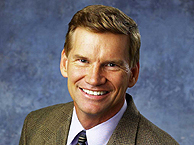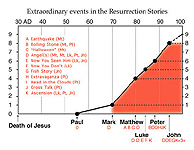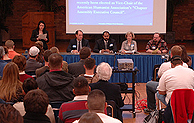Religious Leaders & Sexual Issues
 Most are aware of the Ted Haggard scandal at New Life Church involving homosexual activity and drug use. In another recent news item involving a gay sex scandal, Paul Barnes has resigned from his pulpit at the Grace Chapel megachurch in Denver. In yet a third news item, back at New Life Church, another pastor, Christopher Beard, has admitted to sexual misconduct and resigned. Of course, we all know of the many allegations against Catholic priests in the news media as well. I do not mention these to 'kick a religious group when it's down', but rather to ask what in the world is going on here?
Most are aware of the Ted Haggard scandal at New Life Church involving homosexual activity and drug use. In another recent news item involving a gay sex scandal, Paul Barnes has resigned from his pulpit at the Grace Chapel megachurch in Denver. In yet a third news item, back at New Life Church, another pastor, Christopher Beard, has admitted to sexual misconduct and resigned. Of course, we all know of the many allegations against Catholic priests in the news media as well. I do not mention these to 'kick a religious group when it's down', but rather to ask what in the world is going on here?Many don't remember this, but just prior to the attacks of 9/11/01, the top news item across several networks was the alleged shark attack epidemic. As it turned out, the rate of shark attacks was unchanged. What happened was a strange phenomenon of news reporting. Apparently, whenever something is considered a 'hot topic' within the 'reporter and producer subculture', every opportunity to report on it is seized, I'm guessing so as not to let competing networks get all the credit for reporting something they didn't. Or, possibly this happens because news people get it in their heads that the subject matter is something with teeth (pun only partially intended).
In any event, the result is a public that walks away with the overall impression of something that isn't true about their world. I have written about this disservice to the public, which can happen even if no particular lies are told in a specific case. In reality, the rate of sexual misconduct for religious leaders is no higher than for the rest of the population, and in many cases quite a bit lower, including even for teachers.
But even acknowledging this, there is something especially egregious about this sort of abuse when committed by a person who is supposed to be a moral authority. Even if we realize that we needn't be disproportionately frightened of religious leaders pouncing on us in dark alleys, it becomes a fascinating question to ask, in the cases that do exist, why did they happen and (for these individuals, not the group) is there some strange psychological connection between choosing a social role of projecting morality and their own individual downfall?
Over at the Self Help Magazine website, Henry E. Adams, Ph.D., Lester W. Wright, Jr., Ph.D. and Bethany A. Lohr ask the question, is homophobia associated with homosexual arousal? There seems to be a connection and this may explain some of these cases, but it is too easy to fall into the temptation to brand all anti-homosexuals as having homosexual tendencies, simply because we know it will irk them so.
In other cases, it may be that the feelings of guilt over what they've been raised to believe is evil may cause them to try and make up for their feelings by acting in the opposite extreme. Or perhaps the reason is less personal and more abstract - meaning there is a philosophic perspective that people need rigid authoritarian ethical institutions to 'keep them in line' because they know from their first hand experience how difficult it is to self regulate. In cases involving celibate clergy, it may simply be that this lifestyle attracts people with a variety of personal or social difficulties involving sexual relations or the perceived need to hide them.
I'm sure, as with all things involving people, the reasons are varied and complex, which is what makes it an interesting and important topic if explored thoughtfully, fairly, and without exaggerating frequencies or simplistic agendas of demonizing or making fun of other groups.
Many thanks to my wife Julie, who supplied me with many of the linked references for this post.








